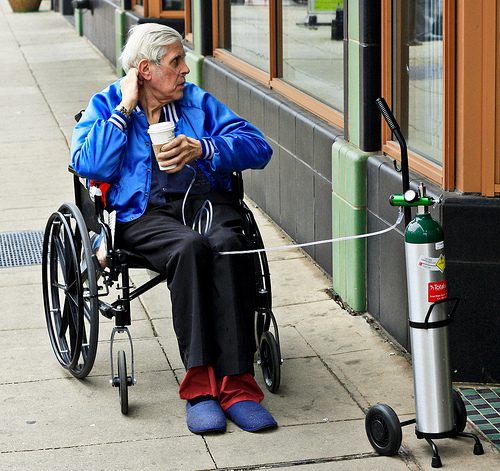Chronic Obstructive Pulmonary Disease, commonly known as COPD, is an umbrella term that refers to a group of lung diseases that block airflow and make breathing difficult. While the symptoms of COPD can be managed, the lung damage cannot be reversed and there is no cure for the disease.
According to a 2010 study, COPD in the Elderly Patient, this illness “remains a major worldwide public health problem and is currently the fourth leading cause of death in the United States.” Further, “COPD accounts for one-fifth of all hospitalizations in individuals aged 75 years and older.”
The COPD Foundation lists several symptoms of COPD including a cough that doesn’t go away; coughing up lots of mucus; shortness of breath, especially with activity; wheezing; and tightness in the chest. It’s also common for the person who had difficulty breathing to become anxious, which can make them feel even more short of breath.
Emphysema, chronic bronchitis and asthma are the most common conditions that make up COPD. Most cases are caused by a lifetime of smoking cigarettes or being around secondhand smoke. Other causes are long-term exposure to irritants in the air such as chemicals, fumes and dust found in many workplaces.
The Mayo Clinic website lists a number of complications of COPD including:
- Respiratory infections (colds, flu and pneumonia all of which make it much more difficult to breathe and cause further damage to lung tissue
- High blood pressure (pulmonary hypertension).
- Heart problems (COPD increases the risk of heart disease, including heart attack).
- Lung cancer (smokers with chronic bronchitis have greater risk of developing lung cancer than do smokers who don’t have chronic bronchitis).
There is no cure for COPD, but there are treatments that can help control symptoms and stop the progression of the disease. Medication, oxygen therapy and keeping indoor air clean, all help. The COPD Foundation suggests that the homes of those with COPD be aired out daily by opening windows and running exhaust fans; smoking not be allowed indoors; dust attracting clutter be removed; bed linens be washed weekly; the humidity level be kept low, that pets be kept off the furniture and floors and carpets be kept clean; and that exposure to household chemicals such as paints and cleaning products be avoided.






